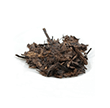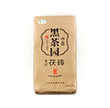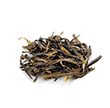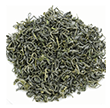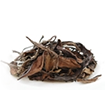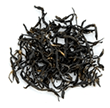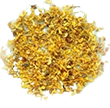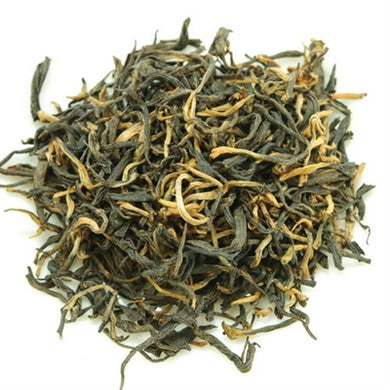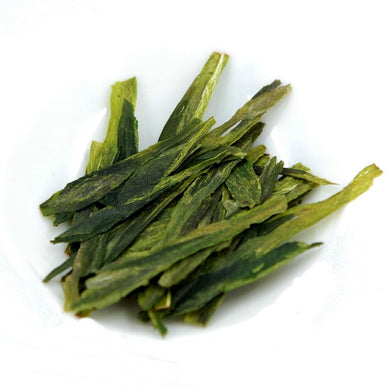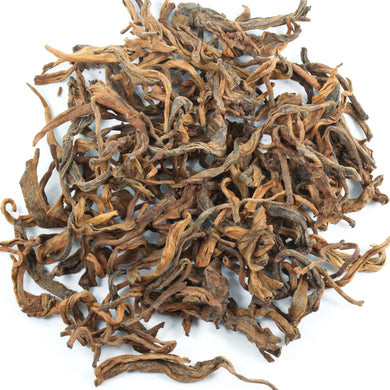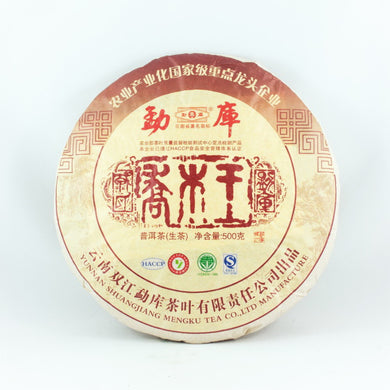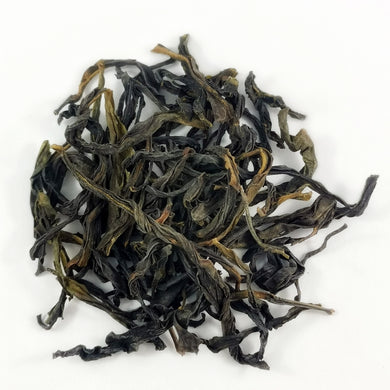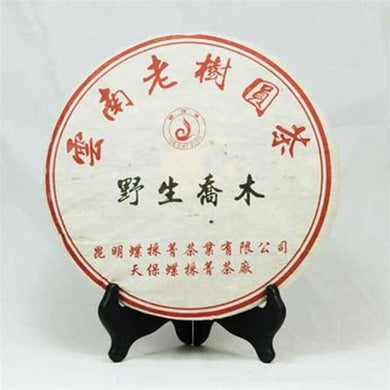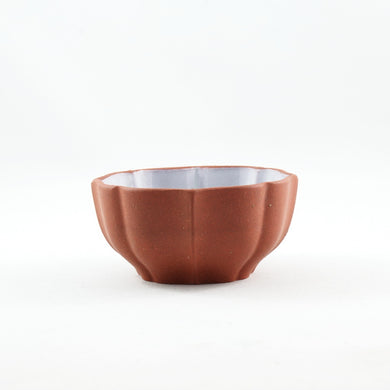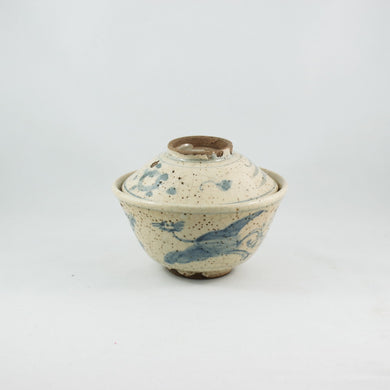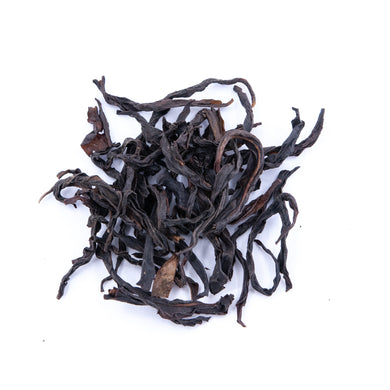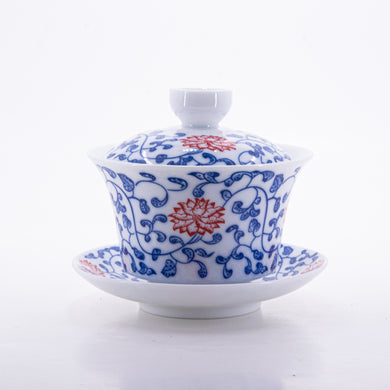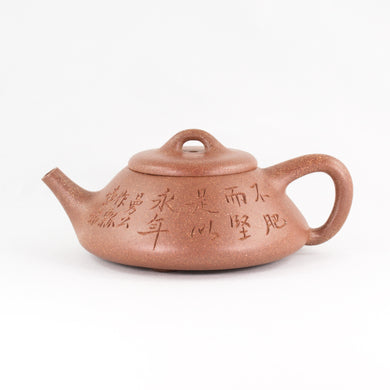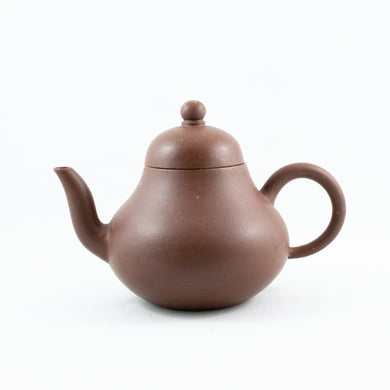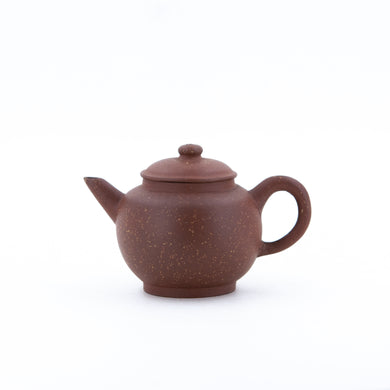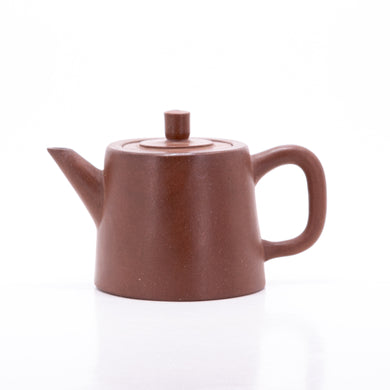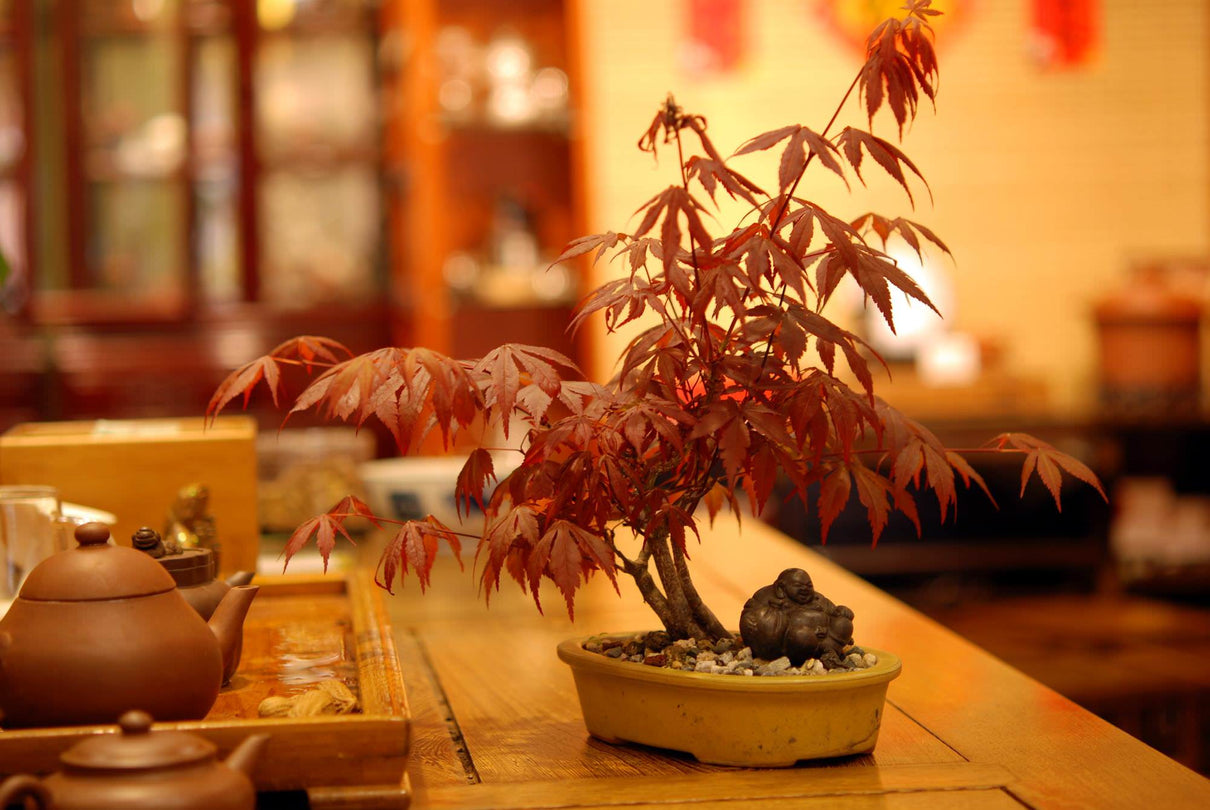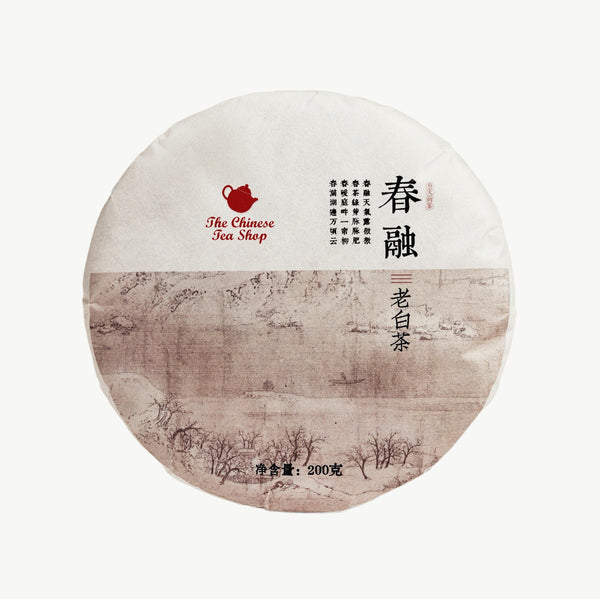
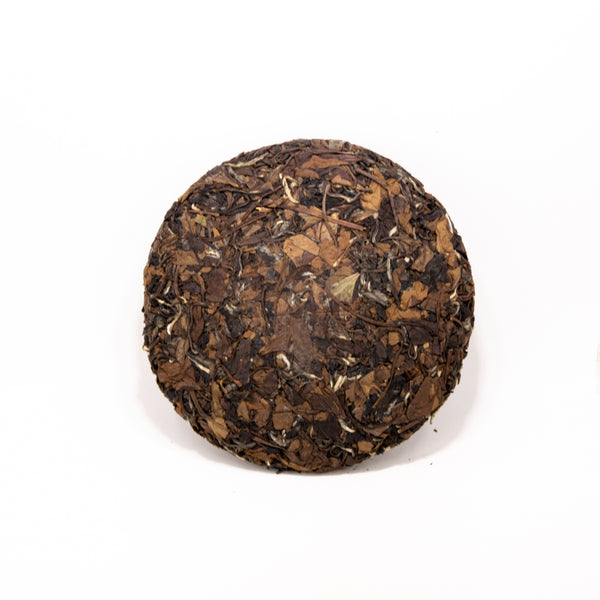
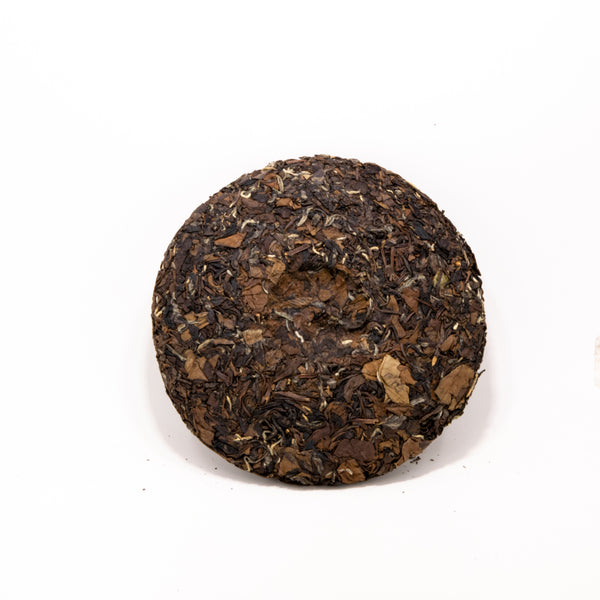
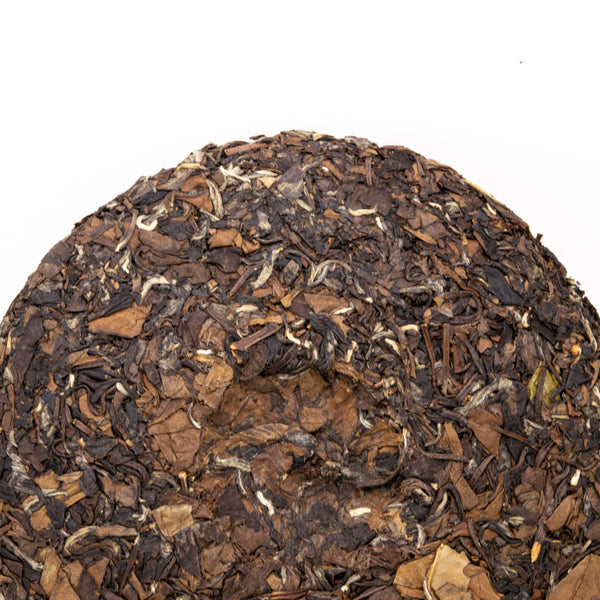
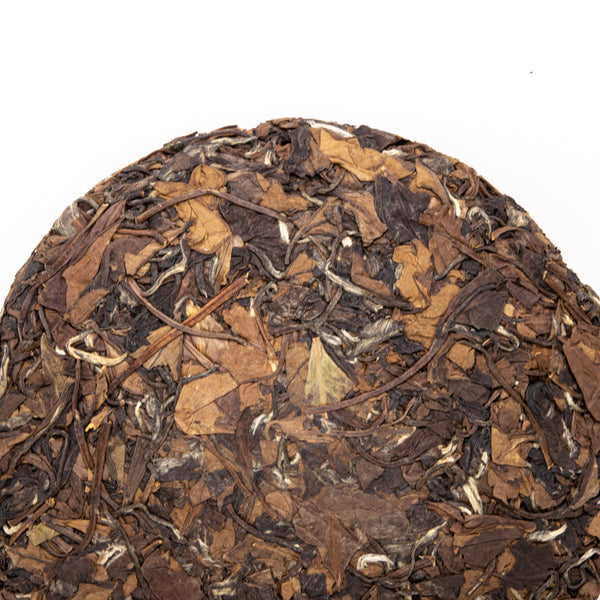
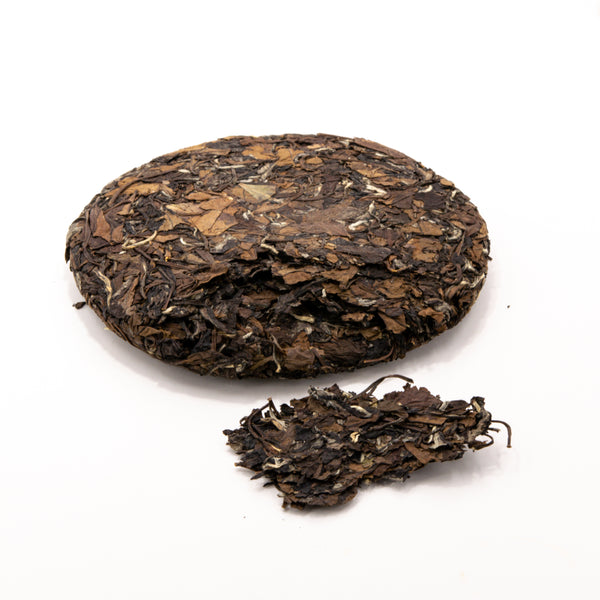
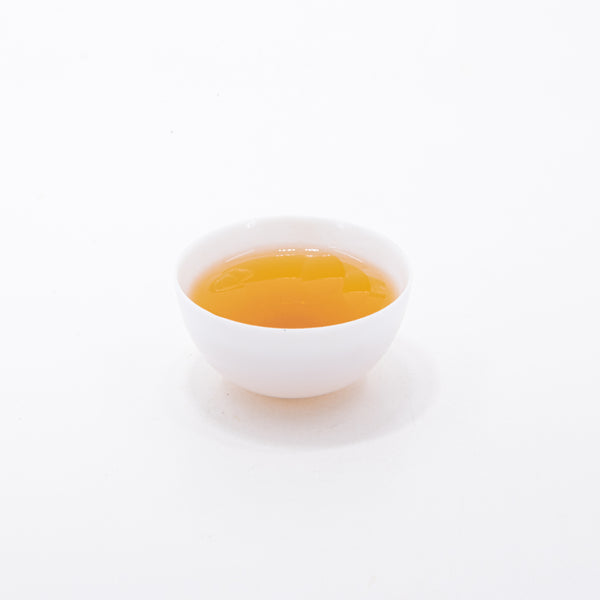
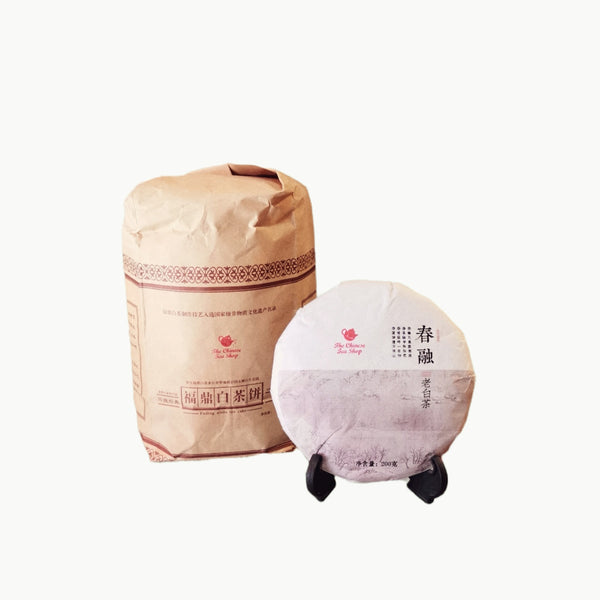
The Chinese Tea Shop is proud to introduce our first exclusive offering – the 2015 Fu Ding Aged White Tea Cake! We have specially ordered this tea cake to be made for us using premium loose-leave Fu Ding white tea that has been aged for 7 years, before it was steamed and lightly compressed into a 200g cake. A blend of young, tender tips and more mature, thick leaves was especially selected to build complexity in the flavours and to add aging potential to the tea. We see this as a winning combo as this tea is both lovely to drink now and to keep for long-term storage!
This tea will be substantially different than other white tea cakes of similar vintage as it has already developed characteristics associated with aged white tea. It is noticeable from the first infusion that the tea liquor is dark orange colour, and the has only the slightest astringency to it. Instead of grassiness, there are aromas and notes of herbal medicine, citrus peel, and a salty umami in the first couple of infusions. Body continues to build as the liquid turns into an amber colour, bringing out richer and deeper flavours of the wet forest floor – earthy, woody, cream, and a sweet aftertaste. This tea has a thick and smooth mouth-feel and makes many infusions. A warm and calming tea as we transition into chillier weather.
Tasting Note: While young tippy white teas tend to offer a mellow and smooth mouthfeel, if you desire a stronger, richer, and more complex tea taste, we have a recommendation for you. Consider adding 10-12 grams of both big and small loose leaves, including some power leaf, into a teapot with a capacity of approximately 100ml to 160ml. To extract the full potential of the tea, we suggest using water heated to a temperature range of 95°C (203°F) up to boiling point. By following these guidelines, you can enhance the flavor profile and experience a more robust and intricate taste in your tea.
Origin: Fu Ding Country, Fujian Province
Oxidation: Medium
Weight Per Cake: 200 grams
Harvest Period: 2015
Pressed : 2022
The Quick Way - 5 Easy Steps
Step 1
Rinse a teapot, small teacups and a small pitcher with hot water.
Step 2
Put one tablespoon of tea leaves in the teapot for every two people being served. Use more for large leaf tea or for a stronger taste.
Step 3
Place the tea leaves inside the teapot and pour in enough hot water to cover the leaves. Pour out the water immediately to rinse the leaves. Use to this chart for proper water temperatures.
|
Green Tea Silver Needle White Teas and most tea made from “tips” |
75C – 80C |
|
Taiwan Oolong Tips Red/Black Teas |
90C – 95C |
|
Black Teas Pu-Erh (Bow-Lay) Te Guan Yin (Iron Buddha) Da Hong Pao (Cliff Tea) Lapsang Souchong Phoenix Oolong Aged White Teas |
95C – boiling |
IMPORTANT NOTES:
- Too much or too little heat for the tea you are making will break down the leaves too quickly or too slowly and the flavour will be inconsistent. Temperatures can be approximate.
- *Boiling means when the water has just reached a slow boil with big bubbles. The Chinese call this “Fish-Eye Water”. For green tea, watch for small streams of tiny bubbles starting to rise from the bottom of the kettle. This is called “Crab-Eye Water”.
- For Oolong teas, the correct temperature is somewhere between these two. If you do not have a thermometer, let the water stand for 2 minutes or so after reaching a first boil to get 90 – 95C C / 194 – 203 F.
Step 4
Empty the teacups and pitcher. Pour enough hot water into the teapot again to cover the leaves. Wait 8 - 10 seconds and pour the tea into the pitcher and serve, a little longer for a stronger taste. For additional brews, repeat Step 4, deducting two seconds for the second brew and adding two seconds for each additional brew.
Step 5
As the aromatic compounds in the tea leaves dissolve in the water, you will notice the subtle flavours of the tea begin to change with each brew. You will be amazed at the difference! To make tea taste even better, try making tea using Gong Fu Cha method, the traditional Chinese art of tea-making.
The Traditional Way Using The Gong Fu Cha Method
You will need:
- Teapot - preferably a small Chinese Yixing teapot. These have the best heat handling properties for tea-making, as well as for developing the flavour. If you only have a large teapot, use the quantities of water as if a small teapot and tea shown on the charts.
- Small teacups (similar in size to Japanese sake cups) or tiny bowls
- Kettle
- Pitcher - small glass or porcelain
- Fine Strainer - to keep your tea clear and free of sediment
- Tea Tray - A cookie sheet or large flat dish lined with a towel can make a good tray to prepare your tea on.
Step 1 - Warm The Teapot and Pitcher, Sterilize The Teacups and Strainer
The first step is to use the right size of teapot for the number of people you are serving. Most teas taste best when made using a Yixing unglazed clay teapot. Use this chart for the correct size of teapot for the number of people you are serving (use this amount of water if you are using a larger teapot). Pour some hot water into the teapot, pitcher, teacups and over the strainer to rinse, warm and sterilize them.
|
Size of Teapot |
Volume (ml / fl oz) |
Number of People Served |
|
#1 size |
70 / 2.4 |
1 - 2 |
|
#2 |
100 / 3.4 |
2 - 4 |
|
#3 |
175 / 6.0 |
3 - 5 |
|
# 4 |
225 / 7.6 |
4- 6 |
Referring to this chart, determine the correct water temperature for the type of tea you are making. Too much or too little heat will break down the leaves too quickly or too slowly and the flavour will be inconsistent. Temperatures can be approximate.
|
Green Tea Silver Needle White Teas and most tea made from “tips” |
75C – 80C
|
|
Taiwan Oolong Tips Red/Black Teas |
90C – 95C |
|
Black Teas Pu-Erh (Bow-Lay) Te Guan Yin ( Iron Buddha) Da Hong Pao (Cliff Tea) Lapsang Souchong Phoenix Oolong Aged White Teas
|
95C – boiling |
* Boiling means when the water has just reached a slow boil with big bubbles . The Chinese call this “Fish-Eye Water”. For green tea, watch for small streams of tiny bubbles starting to rise from the bottom of the kettle. This is called “Crab-Eye Water”.
For Oolong teas, the correct temperature is somewhere between these two. If you do not have a thermometer, let the water stand for 2 minutes or so after reaching a first boil to get 90 – 97C C / 194 – 206 F.
Step 2 – Rinse The Tea Laves
Empty the teapot and pitcher of the warming water. Place the measured amount of tea into the teapot using this chart and fill with the proper temperature water from the chart above. When pouring water in, allow the water to overflow the top of the teapot until the bubbles disappear and the water runs clear.
|
Size |
Size of Leaves |
|||
|
Rolled Leaves |
Less than 1 cm / 3/8 inches |
1 – 2 cm |
2 - 4 cm |
|
|
#1 size |
0.5 - 1 |
0.5 - 1 |
1 – 1.5 |
1.5– 2 |
|
#2 |
1.5 - 2 |
1.5 - 2 |
2 – 2.5 |
2.5 – 3 |
|
#3 |
3 – 3.5 |
3 – 3.5 |
3.5 – 4 |
4 – 4.5 |
|
# 4 |
4 – 4.5 |
4 – 4.5 |
4.5 – 5 |
5 – 5.5 |
This chart shows the amount of tea to use (in number of tablespoons) based on the size of the tea leaves you are using and the size of teapot. Adjust for personal taste.
Replace the lid and immediately pour off all the water (or a bit longer if using compressed tea) and shake out the last drops. Then tilt the lid slightly open on the teapot. This allows the heat in the teapot to escape and not “cook” the leaves so they can retain their aroma
Step 3 –The First Brew
Fill the teapot until the water flows over the top. Place the lid on the teapot and count the proper number of seconds using this chart. Adjust times to taste.
|
|
Rolled Leaves |
Less than 1 cm / 3/8 inches |
1 – 2 cm |
2 - 4 cm |
|
Rinse the leaves |
4 - 8 seconds |
pour off the tea as quickly as possible |
1- 3 seconds |
2 - 4 seconds |
|
First Brew |
10– 15 seconds |
1 – 2 seconds |
9– 12 seconds |
2 – 15 seconds |
|
Second Brew |
8– 13 seconds |
2– 4 seconds |
8– 10 seconds |
10– 13 seconds |
|
Third Brew |
6– 10 seconds |
4– 6 seconds |
6–8 seconds |
8– 10 seconds |
|
Fourth Brew |
4– 10 seconds |
4– 6 seconds |
6– 8 seconds |
8– 10 seconds |
|
Fifth Brew |
6– 12 seconds |
8– 8 seconds |
8– 10 seconds |
10– 12 seconds |
If you have a tea tray, slowly pour a little hot water over the teapot for a few seconds while counting. At the end of the count, pour the tea into the pitcher and tilt the lid open on the teapot. Empty the teacups of the warming water and serve the tea.
Step 4 – Additional Brews
For the second brew, repeat Step 3 until there is no more flavour from the leaves. High quality tea will make many good tasting brews. The taste of low quality tea will start to fade after only a few brews. Believe it or not, high quality tea is usually less expensive to use in the long run than low quality tea, it tastes better and lasts longer!
If the leaves still have some flavour remaining when you finish, you can keep them in the teapot with the lid closed for up to 12 hours. When you're ready to make more tea, just pick up the timing for the next brew where you left off, less a few seconds.
Congratulations!
Congratulations, you are now ready to move on to a more advanced level of tea-making. For full instructions about Gong Fu Cha, see Gong Fu Cha - The Complete Guide To Making Chinese Tea by Daniel Lui)
2015 Chunrong White Tea Cake
First off, I am new to Pu-erh teas, so this opinion is that of noob, as my experiences with Pu-erh are limited. This tea was recommended by The Chinese Tea Shop’s “Ask the tea wizard” software/AI. Being new to this type of tea, I was looking for lighter Pu-erh teas to try, rather than jump straight into the stronger Pu-urh’s. This recommendation really hit my target. The taste was rather complex with no astringency I could notice. The aroma gave a sense of a nice earthy forest, with a strong note of honey and some floral notes as well. The feel was nice and mellow, with a very long pleasant finish. Over all a nice pu-erh for a noob like me. Oh, and I used 195F/90C water. Looking back at the description in The Chinese Tea Shop’s website I will try increasing the water temp to 203F/95C the next time I brew this.
Aged Chunrong White
This is a beautiful Aged White. It will give many, many steepings, has great taste and strong color. It was recommended to me by a good Tea friend and I will recommend it to others in the same way. Good price for the quality as well.
Exceptional
The mouth feel is so silky. Wonderful aged notes across a rich honey body. Tastes even more aged than 2015, the depth of flavor is unbelievable
Exceptional
The mouth feel is so silky. Wonderful aged notes across a rich honey body. Tastes even more aged than 2015, the depth of flavor is unbelievable

